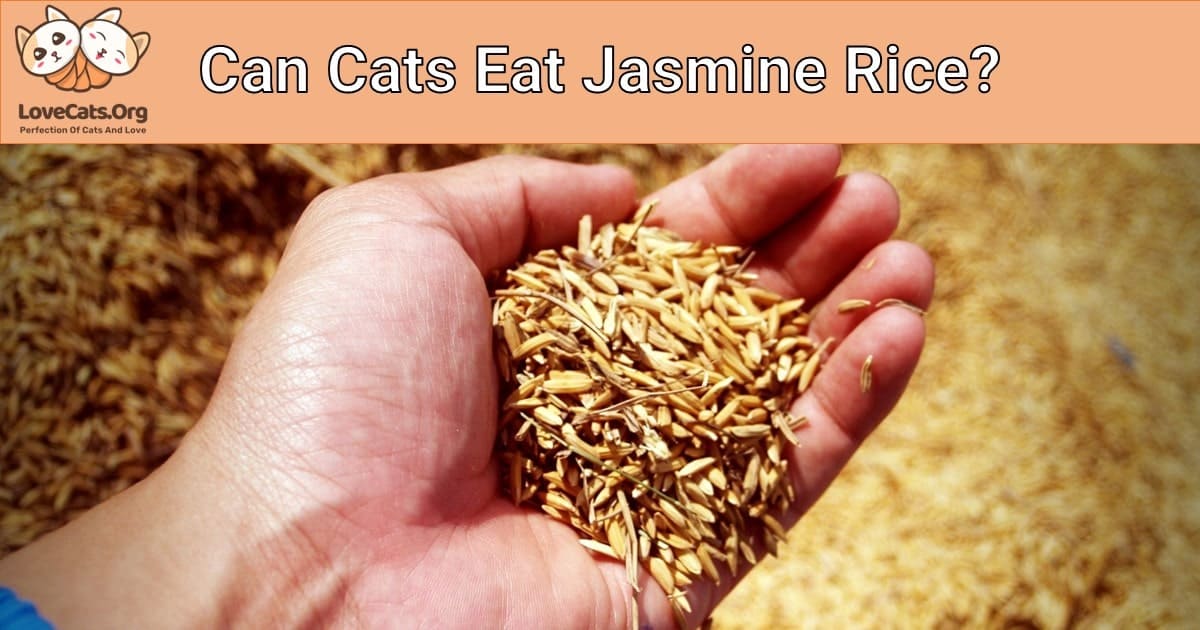Cats can eat jasmine rice!
It’s a great source of carbohydrates and provides essential vitamins, minerals, and fiber.
Jasmine rice is also low in fat, which makes it an ideal food for cats who are overweight or have diabetes.
The smell of cooked jasmine rice may even entice your cat to try something new!
My personal opinion is that feeding your cat some jasmine rice every now and then as part of their diet will provide them with many health benefits:
- Improved digestion.
- Reduced risk for obesity.
- Increased energy levels.
- Better overall nutrition.
- Additionally, no known risks are associated with giving cats small amounts of this grain-based food. So you don’t need to worry about any adverse reactions from eating it – making it safe for all felines!
Do Cats Like Jasmine Rice?
Cats are known to be picky eaters, but do they like jasmine rice? The answer is yes!
Cats can enjoy the taste of jasmine rice.
Here’s why:
- Jasmine Rice has a sweet and nutty flavor that cats find appealing.
- It contains essential vitamins and minerals such as Vitamin B6, magnesium, phosphorus, and iron which help keep your cat healthy.
- Its texture makes it easy for cats to chew on without having difficulty swallowing or digesting it.
- Additionally, some studies have shown that feeding your cat with small amounts of cooked jasmine rice may even reduce hairballs in their stomachs due to its high fiber content!
- So if you’re looking for an alternative food option for your feline friend – try out some delicious jasmine rice today!
Health Benefit Of Jasmine Rice For Cats
Jasmine rice is an excellent source of nutrition for cats.
It contains essential vitamins and minerals necessary to their health, such as Vitamin B6, magnesium, phosphorus, and iron.
Additionally, it has high levels of dietary fiber, which helps keep the digestive system healthy.
This can help prevent constipation or diarrhea in cats.
Jasmine Rice also provides energy from carbohydrates while being low in fat, so your cat won’t gain weight if they overeat!
Furthermore, jasmine rice is rich in antioxidants which protect cells against damage caused by free radicals.
These compounds have been linked with improved immunity and better overall health for felines.
Finally, its natural sweetness makes it an appealing food choice even picky eaters will enjoy!
All-in-all jasmine rice offers numerous benefits to our feline friends, including:
- Improved digestion
- Increased energy without added calories
- Protection from cell damage due to antioxidants
- Natural sweet taste appeal
How Much Jasmine Rice Should I Give My Cat?
It is not recommended to give your cat jasmine rice.
Cats are carnivores and need a diet of animal proteins, fats, vitamins, and minerals for optimal health.
They do not require carbohydrates like grains or starches such as rice in their diets at all.
Suppose you want to feed your cat something other than commercial pet food.
It should be an appropriate protein source, such as cooked chicken breast or fish fillet with no added salt/sugar/oils, plus some vegetables (e.g., carrots).
In summary:
- Jasmine Rice is NOT suitable for cats.
- A balanced diet must include mostly animal proteins.
- Fats, Vitamins, and Minerals are also essential nutrients.
- Other foods can be offered, but only if they provide the proper nutrition, e.g., lean meats and veggies without additives!
Is It Possible That Eating Jasmine Rice Would Kill My Cat?
No, it is not possible that eating jasmine rice would kill your cat.
Jasmine rice is a type of long-grain white or brown fragrant rice cultivated in Thailand for centuries and can be found worldwide today.
It contains essential vitamins and minerals such as:
- Vitamin B1 (Thiamin)
- Iron
- Magnesium
These nutrients are beneficial to cats when consumed in moderation.
However, too much could cause digestive issues like vomiting or diarrhea due to its high starch content.
Additionally, uncooked jasmine rice may contain bacteria that could make your pet sick if ingested, so always cook before feeding!
Finally, some people believe that grains should never be fed to cats because they lack certain digestive enzymes.
This isn’t true either since most commercial cat foods already include grain ingredients without any adverse effects on their health.
So overall, there’s no need to worry about occasionally giving them small amounts of cooked jasmine!
In Conclusion: Can Cats Eat Jasmine Rice?
In conclusion, cats can eat jasmine rice in moderation.
It is important to remember that it should not be a staple of their diet and only be given as an occasional treat or supplement.
Jasmine rice has some nutritional benefits for cats, such as providing them with carbohydrates, proteins, vitamins B1 and B3, and minerals like magnesium and phosphorus.
However, there are also potential risks associated with feeding your cat too much jasmine rice, which includes digestive issues due to the high starch content.
Ultimately it’s up to you whether or not you decide to feed your cat this type of food. If so, ensure they consume 10% of their daily caloric intake from grains like jasmine rice!


